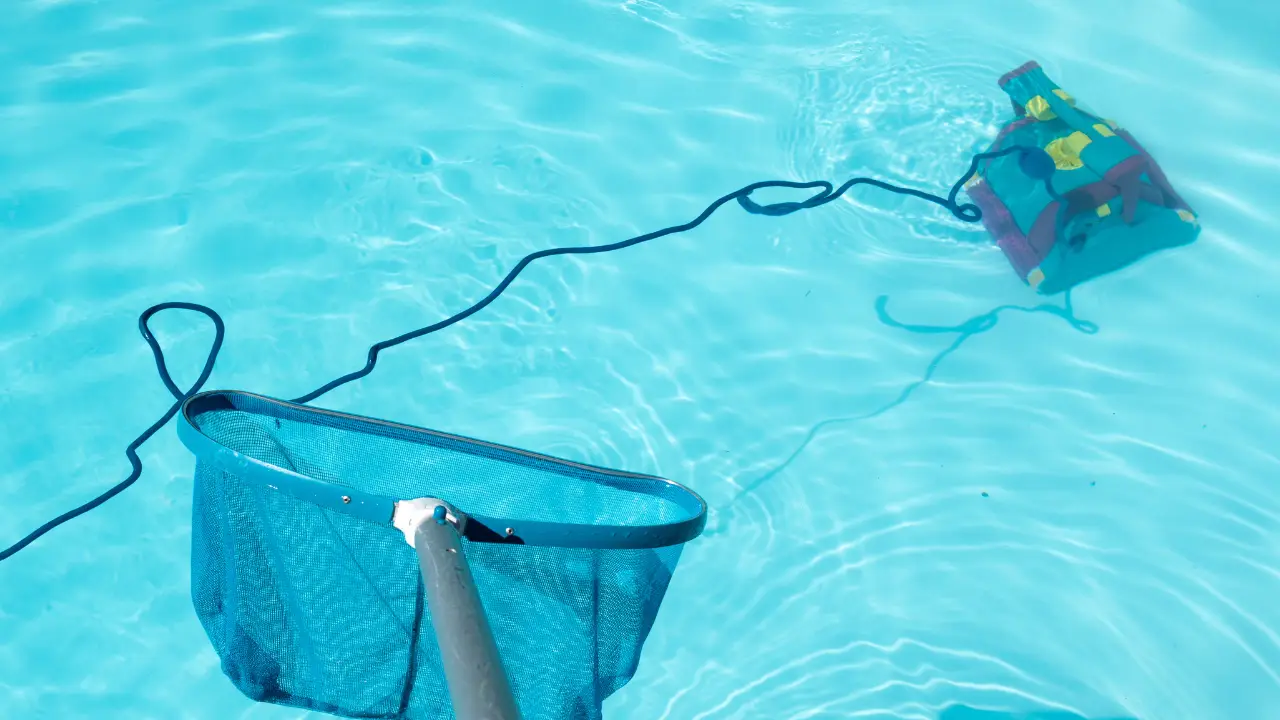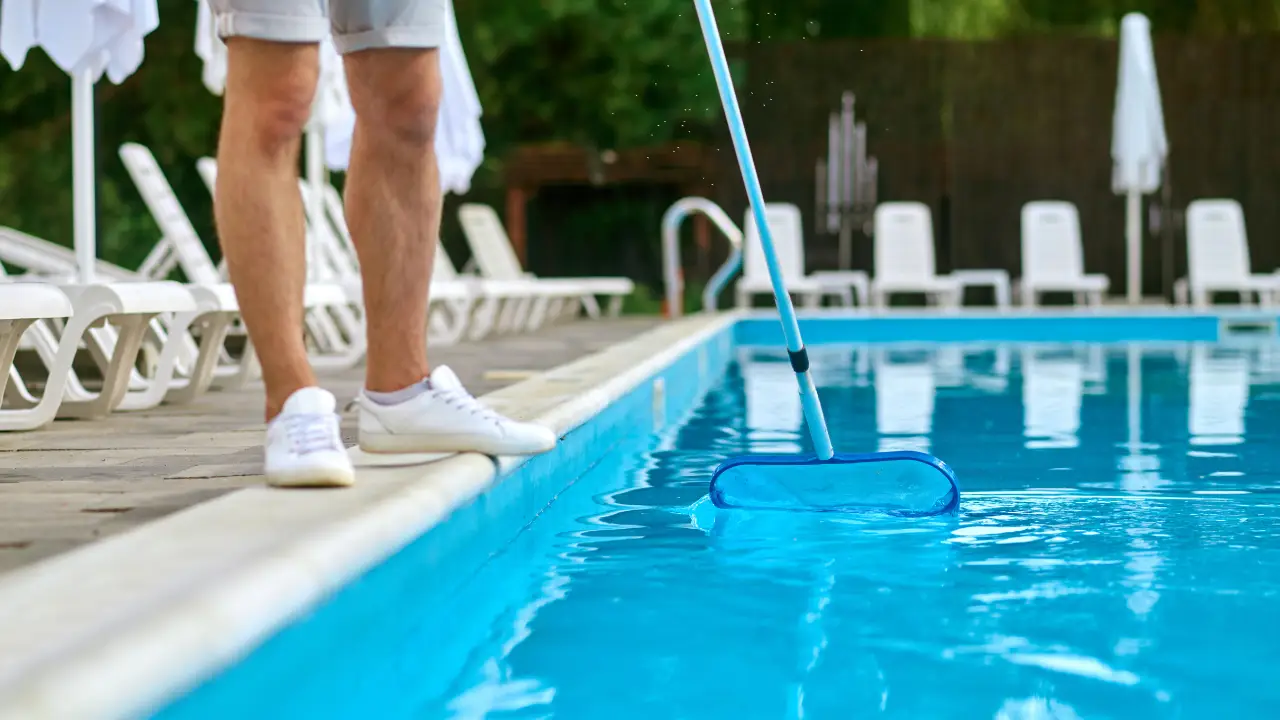When you have a pool at home, you always have a place to cool down and splash around. A swimming pool can also help you make memories and host gatherings with your loved ones. In order to keep your pool in good condition so that it’s always ready for use, it’s important to follow some basic maintenance steps. As the seasons change, the necessary maintenance tasks change. We’ve put together a basic guide to cleaning and maintaining your pool in winter.
Step One: Decide Whether to Close the Pool
The first step in preparing your swimming pool for the cold season ahead is deciding whether or not to close it. The average low temperatures and usage during the winter typically determine whether you should close the pool for the season. If it regularly falls below freezing at night, it’s worth it to close it down. However, if your area has more moderate temperatures after dark, you might choose to keep it open and continue to swim on warmer days. This is especially common among those who have pool heaters and can keep the water warmer.
Here in Houston, Texas, and the surrounding area, the low temperatures rarely drop below freezing. Our climate often includes high temperatures in the 70- and 80-degree range, even during the winter months, so you might choose to keep the pool open all year long. This is certainly an option, but you still need to keep up with winter pool tasks.
Step Two: Schedule a Winter Pool Inspection
Before the winter starts, it’s smart to schedule an inspection with a pool professional. At Manning Pool Service, we offer pool inspection services for those in and around Houston, and we’ll be happy to take a closer look at the equipment that keeps your pool functioning properly. During the inspection, a pool technician will assess each of the components of the pool, including:
- The liner or surface.
- The pump.
- The heater (if applicable).
- The filter.
- Any cleaning equipment.
We’ll look for signs of damage or wear and make recommendations based on the findings. Having your pool inspected during the winter season is a smart investment because it allows you to get things repaired when you may not want to use it every day. The last thing you want to worry about is your pool equipment breaking down during the hottest time of the year, rendering the swimming pool unusable. Winter is the perfect time to invest in maintenance, repairs, or replacement of pool equipment.
Step Three: Drain Some Water
Even if you decide not to close the pool completely, you’ll still need to take a few steps to winterize the pool in the winter season or just before it begins. Although you don’t have to drain the entire pool, you should drain some of the water until the level is just below the skimmer. This step helps to prevent freezing, which can cause cracks in the tiles.
Houston has been hit by some unseasonably cold weather in the recent past, so it’s worth taking this small step to reduce the risk of damage to your pool equipment if that happens again. When draining some of the water, make sure to drain the pump, heater, and filter. These pieces of pool equipment are costly, and you don’t want to run the risk of water inside of them freezing and causing major damage.
Step Four: Clean it Regularly
Keeping the pool clean throughout the winter is a must, and it’s a task we can take on at Manning Pool Services. We offer professional pool cleaning services to property owners in the area. If you don’t want to keep up with pool cleaning on your own, simply contact us to schedule a service. We’ll get you set up on a regular cleaning schedule that keeps the pool in excellent condition.
Unlike other pool companies or chains, we take the time to clean every pool properly. Our technicians spend 45-60 minutes per pool to ensure that every client receives excellent service and high-quality results. We’ll also inspect your equipment routinely and make sure the water has the right pH balance for safety and cleanliness.
Step Five: Check the Water Often
Another aspect of wintertime pool maintenance is testing and treating the water. If you’re still using the pool on warmer days, you should continue to test the water weekly. If you don’t use the pool much during the winter, test the water a few times throughout the season. When water isn’t circulating and the pool isn’t in use, the chance of needing to add chlorine or other chemicals is low, but it’s always best to continue to check. The balance can get off for various reasons, and this can lead to algae growth and other contaminants.
Algae growth isn’t as common when the temperature drops, but it can still happen when it’s 60 degrees or higher outside. Since our winters in this area are generally more moderate, algae can continue to grow even in the wintertime. The right balance of chemicals in the water helps to prevent algae growth, so make sure to test and treat the water often.
You may also want to apply a dose of algaecide once every week or two to keep the growth at bay. Algae can reduce water circulation, clog your filters, and cause other issues, so it’s a problem you don’t want to have in your pool.
Step Six: Keep it Covered
A pool cover is a valuable investment for every pool owner. Covers come in a wide range of shapes, sizes, and styles, so you can find one that fits securely and provides maximum protection. If you don’t already have a pool cover, look for one that’s made of durable and thick material to avoid replacing it every season. If putting the cover on and taking it off is difficult for you, consider adding a motorized cover that’s easier to use.
Keeping your pool covered during the winter helps to prevent leaves and other yard debris from clogging the filters and covering the top of the water. A cover can also prevent rainwater from filling up the pool and causing the water to get out of balance. It’s worth the investment, especially if you don’t plan to use the pool during the winter season.
Step Seven: Put Away Accessories
If you keep pool accessories and equipment on the pool deck throughout the warm seasons, winter is a good time to put these away. Some of the accessories might sustain damage if exposed to sunlight for long periods. If you have a ladder that provides access to the water, you might want to remove this item and store it in a dry place as well. A ladder might impede your ability to cover the pool properly.
Step Eight: Consider Other Treatment Options
In addition to adding chemicals to your pool water when needed, you might want to consider other treatment options to protect the pool during the coldest time of the year. If the calcium level in the water drops too low, it can cause etching and staining on the floor and walls of the pool. Test the calcium level and add a water treatment if it dips below the normal level. Adding a conditioning treatment can also stabilize the water and reduce the risk of UV degradation of chlorine.
Why Does Pool Maintenance Matter in the Winter?
If you’re not actively using your swimming pool during the winter months, you might wonder whether maintenance is really necessary or important. For some, the thought of pool maintenance slips their mind when they’re not using the pool on a regular basis. But failing to keep up with winter pool maintenance can have costly consequences. Neglecting the needs of the pool equipment can cause components to break down, which will cost you more when you have to get them repaired or replaced.
A lack of maintenance can also lead to damage to the finish or liner of the pool, and the stains left by algae and other contaminants could be permanent. When you’re ready to swim again as the weather warms up, the pool might not be useable due to improperly balanced water or damaged equipment. Investing in pool maintenance is a must, no matter the season.
By leaving the seasonal pool maintenance and cleaning tasks to our team at Manning Pool Services, you can focus more on the fun of your pool. We’re the premier provider of pool cleaning and maintenance services in the Houston area. Our clients appreciate the high level of service we provide. We can also adapt to the unique needs of each client. Does your family have skin sensitivities or special needs related to the chemical balance of the pool? We can accommodate these needs.
When performing cleaning and maintenance services, we use the Langelier Saturation Index, also known as LSI. By following this method, we’re able to ensure that the pools we treat remain algae-free and safe for use throughout the changing seasons. Contact us to learn more or request service at your property.
Winter Pool Maintenance: How to Keep Your Pool Clean During Winter | Manning Pool Service – Houston, TX



